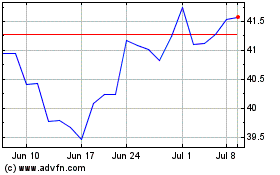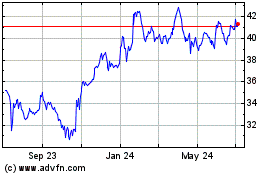CMO Today: Feds Move to Roll Back Digital Privacy Protections
March 29 2017 - 8:25AM
Dow Jones News
By Mike Shields
NO DATA CHARGES: When Verizon Communications acquired AOL, the
latter's CEO, Tim Armstrong, boasted that Verizon could be a
credible competitor to Google and Facebook , the two giants of
online advertising -- and that the quest would be fueled by data.
Verizon's fuel may have just become more plentiful and the playing
field more level, as lawmakers Tuesday rolled back regulations on
telecom and broadband companies that limited their ability to sell
consumer data to third parties, The Wall Street Journal reports.
Previously, internet service providers had to get consumer
permission to use their web-browsing history ( data that can be
very useful for advertisers, the Washington Post reports) as part
of rules put in place by the Federal Communications Commission late
in former President Barack Obama's final term. Since Facebook and
Google are regulated by the Federal Trade Commission, they weren't
subject to such rules and thus seemingly had it easier when it came
to using web and mobile data. It's not entirely clear how wide open
this makes things for the Verizons of the world, since Republican
lawmakers are saying consumer rights are still a top concern.
Regardless, it sure seems as if the rules of online ad targeting
are getting looser, and the days of the Interactive Advertising
Bureau lobbying in D.C. to push "self regulation" seem rather
quaint.
STREAMING HURDLE: Last summer, there was panic in the TV
landscape over slipping Olympic broadcast ratings and an
overarching fear millennials didn't like track and field or live
sports in general. That led to some serious pining by NBCUniversal,
which assured advertisers that while millennials still love the
Olympics, they just like watching the games on digital platforms on
their own time. But now, the TV giant seems to be giving into the
screaming hordes on Twitter (why won't they show curling live?!?!)
and to media-consumption and time-zone realities. Next year, NBCU
will air its prime-time coverage of the Winter Olympics in
Pyeongchang, South Korea, live from coast to coast, the Los Angeles
Times reports. It's not the "every single sport live on TV with no
tape delays or prepackaged features" approach some of the angry
sports purist police have been clamoring for, but it is a big step
toward acknowledging traditional TV can't put the genie back in the
bottle when it comes to consumers' modern media consumption habits.
Remember, NBCU has shelled out $12 billion for the Olympics through
2032 -- an outlay contingent on the company making sure it can
deliver a huge prime-time audience for advertisers.
FUMBLE: Last summer, the startup OneUp Sports was pitching what
sounded like a solid game plan: to crank out lots of mobile
friendly short-form videos about fans' favorite local teams and
distribute them on social media and to thousands of local sites.
The plan was being put in motion just as Facebook was pushing its
Live platform, and there seemed to be an opening for a
next-generation SportsCenter. The company also was getting a boost
from the acquisition of web publisher Insider Sports. But somewhere
along the way, things unraveled for OneUp, which recently closed
its New York office, fired some staffers and backed out of the
Insider Sports deal, CMO Today reports. OneUp also is dealing with
unpaid business partners and is entangled in lawsuits, including
one accusing the company of not paying for an acquisition in full
(an accusation OneUp denies). The company's founder and CEO says
OneUp is just another a bootstrapped startup that bit off more than
it could chew and couldn't get the economics to work. While
attempting to start a digital media business is no sure thing, the
OneUp tale is one of a company that appears to have gotten out way
over its skis.
FACESNAPGRAM: Instagram has been copying Snapchat's features one
by one of late. Most famously, the image-centric social app
blatantly emulated Snapchat's Stories feature, which lets people
string together videos throughout the course of a day until they
expire after 24 hours, with a Stories feature of its own. Now,
Instagram parent Facebook is copying the copying with its own
version of Stories, The Wall Street Journal reports. Besides the
new Stories option, Facebook is making it easier to access people's
cameras via their mobile devices with a single swipe and is adding
a camera-centric direct-messaging option. While imitation is the
sincerest form of flattery, do these tools fit the way people use
Facebook? Snapchat always has been about creating video first and
foremost: When a person opens the app, it starts in camera mode,
and parent company Snap calls itself a camera company. Creating
video stories feels pretty natural for Instagram. But Facebook is
all about its feed and sharing pictures and articles and political
rants. Will this be yet another easily ignored feature, like
Facebook's old "poke" option? Or does Facebook even care -- is this
mostly about stifling Snapchat?
Elsewhere
BuzzFeed plans to go public next year, according to Axios
columnist Mike Allen, and digital rival Vice Media is looking for a
sale. [ Axios]
Media columnist Michael Wolff examines the state of the planned
merger between AT&T and Time Warner and asks, "What do you do
when you need the government's good will and the volatile new
president doesn't like you?" [ Hollywood Reporter]
Former Fox News Chief Financial Officer Mark Kranz has been
offered immunity by prosecutors in exchange for cooperating with
government investigators examining allegations that the network's
former chairman, Roger Ailes, had a long history or harassing
female employees. [ Financial Times]
Meanwhile, two black women filed a lawsuit Tuesday alleging they
were subject to racial harassment while working at Fox News. [ New
York Times]
Discovery Communications is planning to roll out sports-related
content for Snapchat's Discover platform via its Eurosport
subsidiary, as well as wedding-focused content for Amazon. [ CMO
Today]
The annual TV upfront ad sales period is only a few weeks away,
but Fox still hasn't filled its top ad sales role, a job that's
been open since September. [ Ad Age]
Hulu is cranking up its library of Spanish-language programming,
signing deals with Telemundo and Sony Pictures Television to add
hundreds of hours of telenovelas and popular Spanish-language
movies. [ Variety]
Digiday takes a look at the recent struggles at the Guardian as
the U.K. publisher tried to make a big splash in the U.S. over the
past few years and found a challenging digital ad market. [
Digiday]
About Us
Follow us on Twitter: @wsjCMO, @digitalshields, @VranicaWSJ,
@JackMarshall, @alexbruell, @srabil, @asharma
Subscribe to our morning newsletter, delivered straight to your
inbox, at http://on.wsj.com/CMOTodaySignup.
Write to Mike Shields at mike.shields@wsj.com
(END) Dow Jones Newswires
March 29, 2017 08:10 ET (12:10 GMT)
Copyright (c) 2017 Dow Jones & Company, Inc.
Verizon Communications (NYSE:VZ)
Historical Stock Chart
From Mar 2024 to Apr 2024

Verizon Communications (NYSE:VZ)
Historical Stock Chart
From Apr 2023 to Apr 2024
